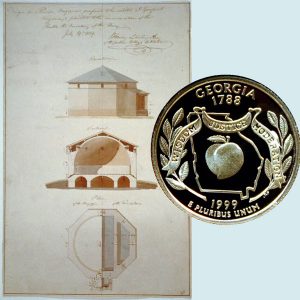Today, the Georgia State Quarter Coin remembers when the men of the council of safety in Savannah liberated the King’s powder late at night on May 11, 1775.
From The History of Georgia: Revolutionary Epoch by Charles Colcock Jones, published in 1883:
=====
Of the determination of these gentlemen not to attend the Continental Congress the Crown was notified by Governor Wright’s dispatch of the 24th of April.
He therein claims the credit of having frustrated the plans of the Savannah congress, and expresses the hope that nothing further would be attempted by those in sympathy with its avowed objects.
At the same time he confesses to no little uneasiness in regard to the hostile attitude maintained by South Carolina toward the province.
Incensed at the refusal of Georgia to become a member of the American Association and to participate in the deliberations of the Continental Congress, the Carolinians resolved to hold no intercourse with the province.
It was also contemplated, in case any blood was shed in Massachusetts, to make sanguinary reprisal in Georgia as a colony loyal to the king.
Thus more and more unquiet grew the public mind.
Thus did the isolated situation of the province become more apparent and onerous.
The more thoroughly the political questions agitating the country were discussed, smaller became the number of such as acknowledged themselves adherents to the Crown, and the more numerous they who favored a confederation of the American colonies.
Forwarded by day and by night came the news of the affairs at Lexington and Concord.
It reached Savannah on the evening of the 10th of May and created the profoundest excitement.
Gage’s order, promulgated by the haughty lips of Major Pitcairn on that epochal day, —“Disperse, ye Villains: ye Rebels, disperse:”—was answered with defiant shouts from the granite hills of New England to the echoing savannahs of the south.
The blood of yeomen shed on Lexington green cemented the union of the colonies.
The thunders of the 19th of April awoke the Georgia parishes from their lethargy and turned the popular tide in favor of resistance to parliamentary rule.
The magazine at the eastern extremity of Savannah, built of brick and sunk some twelve feet underground, contained a considerable supply of ammunition.
So substantial was this structure that Governor Wright deemed it useless to post a guard for its protection.
The excited Revolutionists all over the land cried aloud for powder.
Impressed with the necessity of securing the contents of this magazine for future operations, quietly assembling and hastily arranging a plan of operations,1 Dr. Noble W. Jones, Joseph Habersham, Edward Telfair, William Gibbons, Joseph Clay, John Milledge, and some other gentlemen, most of them members of the council of safety and all zealous in the cause of American liberty, at a late hour on the night of the 11th of May, 1775, broke open the magazine and removed therefrom about six hundred pounds of gunpowder.2
A portion was sent to Beaufort, South Carolina, for safekeeping, and the rest was concealed in the garrets and cellars of the houses of the captors.
Upon ascertaining the robbery, Governor Wright immediately issued a proclamation offering a reward of £150 sterling for the apprehension of the offenders.3
It elicited no information on the subject, although the actors in the matter are said to have been well known in the community.
The popular heart was too deeply stirred, and the “ Sons of Liberty” were too potent to tolerate any hindrance or annoyance at the hands of Royalist informers.
The tradition lives, and is generally credited, that some of the powder thus obtained was forwarded to Cambridge, Massachusetts, and was actually expended by the patriots in the memorable battle of Bunker Hill.
We know that the liberty loving citizens of Savannah, on the 1st of June, 1775, deeply moved by the distresses which the Bostonians were experiencing from the enforcement of the “ late acts of a cruel and vindictive Ministry,” and ardently desiring that the noble stand they had taken in the defense of those rights to which as men and British subjects they were entitled might be crowned with success, transmitted by the Juliana, Captain Stringham, and under the special conduct of John Eaton LeConte, Esq., sixty-three barrels of rice and one hundred and twenty-two pounds sterling in specie for the relief of such as had recently left the town of Boston.
It is not improbable that the powder in question may have been forwarded in some such way at an earlier day.
1 This meeting was held at the residence of Dr. Jones. McCall’s History of Georgia, vol. ii. p. 43. Savannah. 1816.
2 In his communication to the Earl of Dartmouth, dated Savannah, May 12, 1775, Sir James Wright estimates the amount stolen at the figure we have named, and says he was informed by the powder receiver that there remained in the magazine “not above 300 lbs. of the King’s Powder, and about as much more belonging to the merchants.” David Montaigut, Esq., was then the powder receiver of the province.
3 See the proclamation printed in the Georgia Gazette of May 17, 1775.
=====
The Georgia State Quarter Coin shows with a Benjamin Henry Latrobe drawing of a powder magazine for the Navy Department in Virginia, circa 1809.
